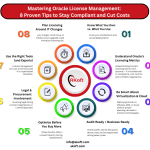Oracle conducts software audits primarily to ensure compliance with their licensing agreements. Here’s a detailed look at the reasons behind Oracle’s audit practices:
1. License Compliance
- Protecting Intellectual Property: Oracle licenses complex software products, and audits help ensure customers are using them according to the terms set in their contracts.
- Enforcing Contractual Agreements: Oracle’s contracts often have specific conditions for the usage, deployment, and maintenance of their software. Audits are a way to verify that these conditions are being met.
2. Revenue Protection and Recovery
- Identifying Under-Licensing or Overuse: When customers use more licenses than they’ve paid for, Oracle loses revenue. Audits help identify these cases, allowing Oracle to recover fees owed for unauthorized or excessive usage.
- Encouraging Correct Licensing: Audits often lead to customers purchasing additional licenses to meet compliance, which contributes to Oracle’s revenue.
3. Encouraging License Optimization
- Helping Customers Understand Usage: Through an audit, Oracle can identify areas where customers might benefit from optimizing their licensing. This can also open opportunities for customers to move to newer Oracle products or cloud offerings.
- Promoting Cloud Migration: Often, audit findings encourage companies to consider Oracle’s cloud solutions, where licensing terms can be more flexible and where Oracle offers competitive incentives.
4. Ensuring Standardization and Security
- Maintaining Software Quality Standards: Unlicensed or unauthorized modifications to Oracle software can introduce security risks. Audits help Oracle ensure that customers are using their software as intended, safeguarding the quality and integrity of their systems.
- Mitigating Security Vulnerabilities: Unauthorized software use, especially outdated versions, can lead to vulnerabilities. By ensuring compliance, Oracle also helps reduce the risk of security breaches in customer environments.
5. Market Intelligence
- Understanding Customer Needs and Usage Patterns: Audits provide Oracle with data on how customers use their software, which can inform product development, updates, and feature enhancements.
- Supporting Product Lifecycle Management: By analyzing data from audits, Oracle can make strategic decisions about the lifecycle of its products, including which ones to update, sunset, or replace.
6. Legal and Contractual Rights
- Exercising Rights Granted by the License Agreement: Oracle’s license agreements typically grant them the right to audit customers. This is a standard industry practice that allows them to enforce compliance and maintain control over how their intellectual property is used.
7. Industry Standard Practice
- Aligning with Software Industry Norms: Software audits are a common practice among major software vendors, and Oracle’s audits align with industry standards for compliance and enforcement. Audits are a part of the software lifecycle management process for most enterprise software providers.
In summary, Oracle’s audits help the company protect its intellectual property, ensure fair licensing, and promote customer compliance. They also offer Oracle insights into product usage that can support business development and maintain the security and quality of their software products across client organizations.
AKoft’s Audit Defense program is designed to help you at any stage of a software audit, delivering you a set of key reports and recommendations to help you defend against a vendor audit. Ongoing support is also a part of the service we provide.




